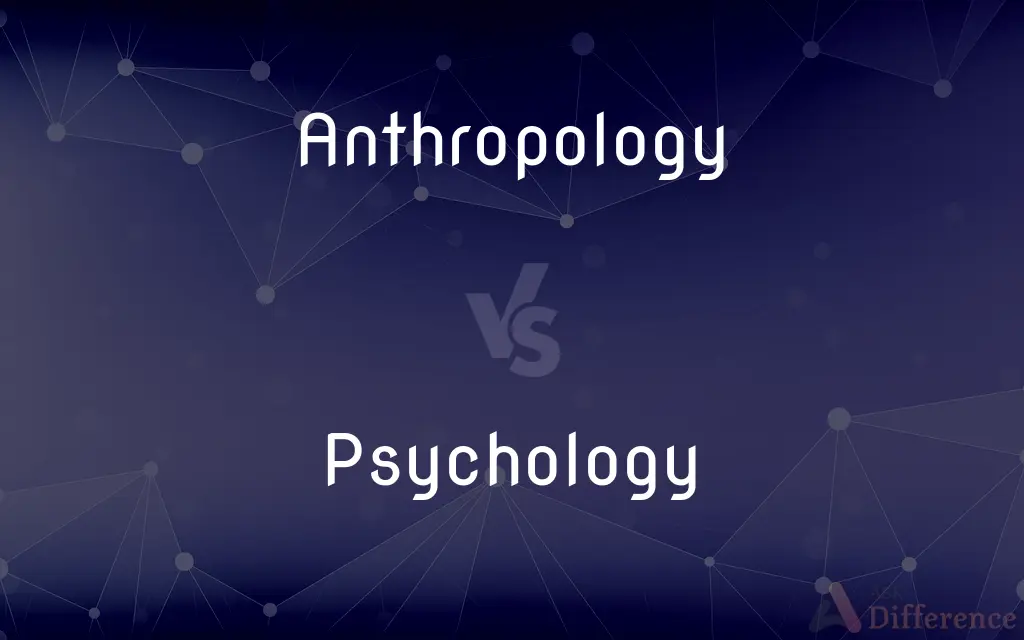Anthropology vs. Psychology — What's the Difference?
Edited by Tayyaba Rehman — By Fiza Rafique — Updated on October 11, 2023
Anthropology studies human societies and cultures. Psychology studies the mind and behavior. Both explore facets of humanity, but from different perspectives.

Difference Between Anthropology and Psychology
Table of Contents
ADVERTISEMENT
Key Differences
Anthropology is the study of human beings, encompassing their evolution, behavior, and cultural developments. Psychology, on the other hand, delves into the intricacies of the human mind, behavior, and the processes associated with it. While anthropology focuses on human societies and their evolution, psychology zeros in on individual mental and behavioral patterns.
Anthropology often involves studying societies in their entirety, examining artifacts, customs, and social practices. Psychology, conversely, might analyze individual or group behaviors, emotional responses, and cognitive processes. While an anthropologist might study a community's ritual, a psychologist could investigate the emotional reactions involved in such a ritual.
The tools and methods of anthropology and psychology differ significantly. Anthropologists might engage in fieldwork, participant observation, and ethnography. Psychologists, meanwhile, often employ experiments, surveys, and observational studies. While anthropology often delves into qualitative data, psychology typically leans more towards quantitative data.
Anthropology can be subdivided into branches like cultural, biological, linguistic, and archaeological anthropology. Psychology also has its specializations, including clinical, cognitive, developmental, and social psychology. Though both disciplines study humanity, their areas of focus and methodologies distinctively set them apart.
Ultimately, anthropology and psychology both aim to enhance our understanding of humans. Anthropology offers insights into human societies, their history, and cultural practices. Psychology, meanwhile, seeks to unravel the complexities of the human mind, its functions, and how it influences behavior.
ADVERTISEMENT
Comparison Chart
Primary Focus
Human societies and cultures
Mind and behavior
Methodologies
Fieldwork, ethnography, participant observation
Experiments, surveys, observational studies
Branches
Cultural, biological, linguistic, archaeological anthropology
Clinical, cognitive, developmental, social psychology
Data Type
Often qualitative
Often quantitative
Study Level
Societal or cultural level
Individual or group level
Compare with Definitions
Anthropology
Study of human societies and cultures.
Her passion for anthropology led her to remote tribes.
Psychology
Study of the human mind and behavior.
He pursued a career in psychology to understand human emotions.
Anthropology
Examination of human evolution.
Anthropology has shed light on our ancestral roots.
Psychology
Examination of emotional and behavioral disorders.
Clinical psychology aids people with mental health challenges.
Anthropology
Investigation of ancient human artifacts and relics.
She specialized in the anthropology of ancient civilizations.
Psychology
Exploration of cognitive processes and functions.
Cognitive psychology delves into how we think and process information.
Anthropology
Exploration of linguistic variations and development.
Linguistic anthropology studies the evolution of language.
Psychology
Investigation into the social dynamics influencing behavior.
Social psychology studies how group dynamics affect individual behavior.
Anthropology
Study of human biological and physiological characteristics.
Biological anthropology focuses on human physical evolution.
Psychology
Analysis of developmental changes across lifespan.
Developmental psychology tracks emotional growth from infancy to adulthood.
Anthropology
Anthropology is the scientific study of humanity, concerned with human behavior, human biology, cultures and societies, in both the present and past, including past human species. Social anthropology studies patterns of behaviour, while cultural anthropology studies cultural meaning, including norms and values.
Psychology
Psychology is the science of mind and behavior. Psychology includes the study of conscious and unconscious phenomena, as well as feelings and thought.
Anthropology
The study of human societies and cultures and their development.
Psychology
The science that deals with mental processes and behavior.
Anthropology
The scientific study of the origin, the behavior, and the physical, social, and cultural development of humans.
Psychology
The emotional and behavioral characteristics of an individual, a group, or those engaged in a given activity
The psychology of war.
Anthropology
That part of Christian theology concerning the genesis, nature, and future of humans, especially as contrasted with the nature of God
"changing the church's anthropology to include more positive images of women" (Priscilla Hart).
Psychology
Subtle tactical action or argument used to manipulate or influence another
He used poor psychology on his employer when trying to make the point.
Anthropology
The holistic scientific and social study of humanity, mainly using ethnography as its method.
According to anthropology, there are six basic patterns of kinship terminology (i.e., "kin naming systems"): Sudanese, Hawaiian, Eskimo, Crow, Omaha, and Iroquois.
Psychology
(Philosophy) The branch of metaphysics that studies the soul, the mind, and the relationship of life and mind to the functions of the body.
Anthropology
The science of the structure and functions of the human body.
Psychology
(uncountable) The study of the human mind.
Anthropology
The science of man, including the study of the ditribution of physical and cultural attributes in relation to man's origin, location, history, and environment; - sometimes used in a limited sense to mean the study of man as an object of natural history, or as an animal.
Psychology
(uncountable) The study of human or animal behavior.
Anthropology
That manner of expression by which the inspired writers attribute human parts and passions to God. See also anthropopathite, anthropopathism, anthropomorphist.
Psychology
The study of the soul.
Anthropology
The social science that studies the origins and social relationships of human beings
Psychology
(countable) The mental, emotional, and behavioral characteristics pertaining to a specified person, group, or activity.
Psychology
The science of the human soul; specifically, the systematic or scientific knowledge of the powers and functions of the human soul, so far as they are known by consciousness; a treatise on the human soul.
Psychology, the science conversant about the phenomena of the mind, or conscious subject, or self.
Psychology
The science of mental life
Common Curiosities
Can anthropology give insights into individual behavior?
While anthropology primarily studies societies, insights into individual behavior can be derived from societal and cultural contexts.
What is the primary focus of anthropology?
Anthropology focuses on human societies, cultures, and their evolution.
Can psychology provide insights into cultural practices?
While psychology focuses on the mind, it can offer insights into behaviors influenced by cultural contexts.
What does psychology primarily study?
Psychology studies the human mind and its influence on behavior.
Which discipline would study ancient human artifacts?
That would be anthropology, specifically archaeological anthropology.
Which field would explore group dynamics and its influence on individuals?
That would be social psychology.
Are emotions and feelings a subject of study in psychology?
Absolutely, emotions and their influence on behavior are core topics in psychology.
Would an anthropologist be likely to conduct controlled experiments?
While not as common as in psychology, some anthropologists might use experimental methods, especially in applied anthropology.
Are the methodologies of anthropology and psychology similar?
No, anthropology often involves fieldwork and ethnography, while psychology uses experiments and surveys.
How does anthropology contribute to our understanding of human evolution?
Through branches like biological anthropology, it examines human physical evolution and ancestral lineage.
Is linguistic study a part of anthropology?
Yes, the study of language evolution and variations falls under linguistic anthropology.
Does psychology only focus on mental disorders?
No, psychology explores all aspects of the mind, including normal cognitive functions and behaviors.
Can psychology provide insights into societal behaviors?
While psychology primarily studies individuals or groups, societal behaviors can be inferred by scaling up individual or group dynamics.
Is anthropology only concerned with ancient or primitive societies?
No, anthropology studies both ancient and contemporary societies, providing insights into cultural evolution and practices.
Do both anthropology and psychology have sub-disciplines?
Yes, both fields have various specializations focusing on different aspects of their broader study.
Share Your Discovery

Previous Comparison
Anelace vs. Dagger
Next Comparison
Thx vs. TnxAuthor Spotlight
Written by
Fiza RafiqueFiza Rafique is a skilled content writer at AskDifference.com, where she meticulously refines and enhances written pieces. Drawing from her vast editorial expertise, Fiza ensures clarity, accuracy, and precision in every article. Passionate about language, she continually seeks to elevate the quality of content for readers worldwide.
Edited by
Tayyaba RehmanTayyaba Rehman is a distinguished writer, currently serving as a primary contributor to askdifference.com. As a researcher in semantics and etymology, Tayyaba's passion for the complexity of languages and their distinctions has found a perfect home on the platform. Tayyaba delves into the intricacies of language, distinguishing between commonly confused words and phrases, thereby providing clarity for readers worldwide.
















































